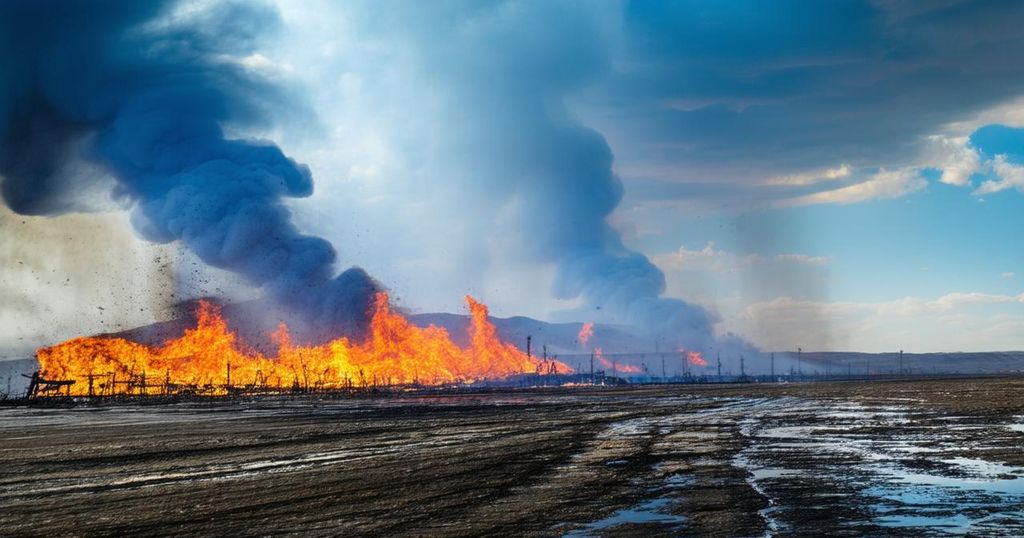UN Warns of Catastrophic Global Warming: Urgency for Climate Action
The United Nations warns that the world is heading towards a “catastrophic” 3.1 degrees Celsius increase in global warming unless significant measures are undertaken to reduce emissions. Current emission levels are rising, jeopardizing the possibility of limiting temperature increases to the internationally agreed target of 1.5 degrees Celsius. This situation necessitates intense global mobilization and a commitment from nations during upcoming climate talks to strengthen their climate plans and financial support for developing nations.
According to a recent warning from the United Nations, the world is on course for a concerning 3.1 degrees Celsius increase in global temperatures this century unless substantial efforts are made to reduce greenhouse gas emissions. The United Nations Environment Programme (UNEP) has published its annual report highlighting the disparity between necessary emissions reduction to meet the international target of limiting warming to 1.5 degrees Celsius and the actions countries have pledged or implemented. The report indicates that without unprecedented global mobilization, the dream of capping temperature rise to 1.5 degrees Celsius will soon be unachievable. Currently, anticipated temperature increases range from 2.6 to 3.1 degrees Celsius, contingent upon the fulfillment of the climate actions that countries have committed to undertake. This alarm bell from the UN arrives poised before upcoming COP29 talks in Baku, Azerbaijan, where nations are urged to take stronger actions to bridge the emissions gap and to enhance financial support for developing countries in their climate adaptation efforts. In the 2015 Paris climate accords, countries agreed to cap temperature increases to “well below” 2 degrees Celsius while striving to limit the increase to 1.5 degrees Celsius above pre-industrial levels. Scientists have long argued that there is no safe threshold for climate change, but the 1.5 degrees mark is increasingly seen as a crucial boundary to avoid severe impacts, including heatwaves, droughts, floods, and the destabilization of natural ecosystems. Nations are presently formulating their intended nationally determined contributions (NDCs) to align with these goals through strategies aimed at curbing emissions from fossil fuel consumption and promoting initiatives like forest restoration to sequester carbon. However, with preparations underway for the next series of action plans leading up to 2035, UNEP expresses grave concerns that meeting the 1.5 degrees Celsius target is slipping further from reach. The report attributes an ongoing rise in global greenhouse gases, which increased by 1.3% in 2023 alone – representing an acceleration compared to the previous decade – with the G20 nations accounting for approximately 77% of total emissions. In response to the findings, UN Secretary-General António Guterres characterized the current circumstances as the world being “teetering on a planetary tightrope.” He emphasized that leaders must address the emissions gap decisively to avoid plunging into a climate crisis that would disproportionately affect the most vulnerable populations worldwide. He noted, “current policies are taking us towards a catastrophic 3.1C temperature rise by the end of the century.” Further, Inger Andersen, UNEP’s Executive Director, highlighted the urgency of the situation, stating, “Climate crunch time is here. We need global mobilisation on a scale and pace never seen before – starting right now, before the next round of climate pledges – or the 1.5C goal will soon be dead.” She urged nations at COP29 to significantly enhance their efforts, thus paving the way for more robust national strategies aimed at preserving the 1.5 degrees Celsius pathway. It is imperative that countries collectively commit to drastically reducing 42% of annual greenhouse gas emissions by 2030 and 57% by 2035 to remain on track to meet the ambitious 1.5 degrees Celsius target. According to UNEP, achieving these substantial reductions is technically feasible, particularly by expanding renewable energy sources, improving energy efficiency, reducing reliance on fossil fuels, and rehabilitating natural ecosystems such as forests and mangroves.
The issue of climate change represents one of the most pressing challenges faced by humanity today. Globally, rising temperatures contribute to adverse effects such as extreme weather events, rising sea levels, and biodiversity loss. The United Nations, along with numerous scientific bodies and environmental organizations, emphasizes the importance of limiting temperature increases to avert grave consequences for the planet and human civilization. The 2015 Paris Agreement is a pivotal framework under which countries committed to endeavours that would cap global warming and mitigate impacts through specific, measurable climate actions. The most recent UNEP report illustrates the alarming gap between pledges made and actions taken by nations, stressing the urgency of more aggressive measures to address climate change effectively.
In conclusion, the UN’s warning about the trajectory toward a 3.1 degrees Celsius increase highlights a critical moment for global climate action. The necessity for immediate and unprecedented efforts to reduce emissions cannot be overstated. As the world prepares for COP29, the responsibility rests upon each nation to amplify their commitments and collaborate efficiently to protect the most vulnerable populations and the planet. The path toward a sustainable future rests in the hands of global leaders, emphasizing the urgency of enhanced climate pledges and decisive actions in the coming years.
Original Source: www.independent.co.uk




Post Comment